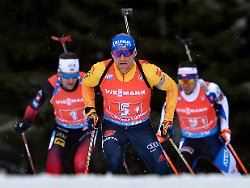Friday, November 26th, 2021
Biathletes facing a difficult season
Without Peiffer, everything will be even harder
The German biathlon has lost its savior: Medal guarantor Arnd Peiffer will not ensure conciliatory results this winter. This is especially a problem for men. It’s going to be a complicated season.
Erik Lesser’s forecast should not please every biathlon fan. A relay medal at the Olympics in Beijing, three to four podium places in the World Cup and two athletes among the top ten – then the season would be a good one for the German men’s team. “You can’t expect any leaps in the air, we have to bake small rolls,” said the 33-year-old veteran before the start of the Olympic winter. After the resignations of Olympic champions Arnd Peiffer and Simon Schempp, it will be even more difficult for Lesser, Benedikt Doll and Co. to make it to the podium in view of the strong competition.
Nobody talks about victories. In the preseason, Peiffer, who is now with the team as an ARD TV expert, ensured the only German men’s success and a total of five podium places. “I don’t want to say that we haven’t been successful in recent years, we treaded on the spot. A lot was concealed,” said Lesser, whose last successes were two World Cup golds in 2015. The team is in a state of upheaval, as national coach Mark Kirchner emphasized. The individual races will start on Saturday (from 11.45 a.m. / ZDF and Eurosport), followed by the first sprint races of the Olympic winter on Sunday (from 11 a.m.).
It looks better with women
Above all, the ex-world champions Denise Herrmann and Franziska Preuß can figure out a lot. Preuss took four podium places in the preseason, Herrmann three. Preuss in particular was often close to victory, usually only missing one goal: “I want to pick up where I left off last year. Hopefully with more outliers to the front.” Herrmann, who suffered from shingles shortly before the end of the season, wants to get back to her running strength. “Last season was not an easy one. It is easier to plan because the big event is in February. What happens until then is the way to the goal, the means to an end,” said the 32-year-old.
The veterans Maren Hammerschmidt, Franziska Hildebrand and Karolin Horchler did not make it into the World Cup team for the time being. While the Norwegian Johannes Thingnes Bö is aiming for his fourth large crystal ball as the overall winner in a row for the men, his teammates Tiril Eckhoff and Marte Olsbu Röiseland can be expected in the women’s category. The exciting question is whether Sturla Holm Lægreid is giving his team-mate Bö such a big fight as it was last time.
Also this season, Corona determines the scenery. Before the kick-off in Östersund, 98 percent of the team members, including athletes, coaches, officials and technicians are fully vaccinated or have recently recovered from it, as the world association announced. The remaining two percent must do a PCR test every 72 hours. According to the association, the quota in the German Ski Association is 100 percent. The IBU itself only allows vaccinated people to attend events among its own employees and officials.
Compulsory vaccination would “significantly simplify”
A general compulsory vaccination would significantly simplify the “extreme” organizational effort caused by the corona, said IBU sports director Felix Bitterling: “But I am now relatively unemotional. We have to ensure that the events are safe for everyone involved, that they have the basis for earning their wages . And it has to be as safe as it can be. “
A second Corona season without fans would be expensive for the IBU as an association “that has managed well and is in good shape, but that would be a much better option than canceling events,” said Bitterling. “If one or two World Cups were canceled, we could endure it financially, if there were several it would be tough for our biathlon family, especially financially.” The IBU is well positioned with its precautions, and spectators have so far – at least not categorically – depending on the country under different requirements – as in the previous season. “But that is a subject that is extremely active, depending on national measures,” said Bitterling.
And Corona strikes again right away. The second World Cup in Hochfilzen will now take place again without fans due to the lockdown in Austria, as will the races in Oberhof at the beginning of January. At the start of the season in Östersund on Saturday there are no restrictions for fans, just as there are no audience limits.
